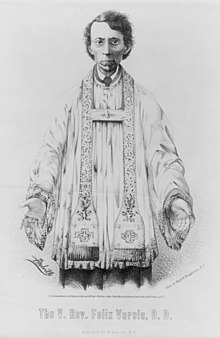Félix Varela
| Venerable Félix Varela | |
|---|---|

Circa 1853 image of Felix Varela
|
|
| Priest | |
| Born | November 20, 1788 Havana, New Spain |
| Died | February 27, 1853 (aged 64) St. Augustine, Florida |
| Venerated in | Roman Catholic Church |
The Venerable Félix Varela y Morales (November 20, 1788–February 27, 1853) was a Cuban-born Roman Catholic priest and independence leader in his homeland who is regarded as a notable figure in the Catholic Church in both Cuba and the United States.
Varela was born in Havana, Cuba, then still part of New Spain, and grew up in St. Augustine, Florida, the grandson of Lieutenant Bartolomé Morales, the commander of military forces in Spanish Florida, who was stationed there and who helped to raise Felix after the death of his mother in childbirth. As a teenager, he refused his grandfather's offer to send him to a military academy in Spain, returning to Cuba, where he studied to become a priest at San Carlos and San Ambrosio Seminary in Havana, the only seminary in Cuba. He also studied at the University of Havana. At the age of 23 he was ordained in the Cathedral of Havana for the Diocese of San Cristóbal de la Habana.
Joining the seminary faculty within a year of his ordination, he taught philosophy, physics and chemistry. In his position there, he taught many illustrious Cubans, including José Antonio Saco, Domingo del Monte, José de la Luz y Caballero and Felipe Poey. Referring to Varela, De la Luz said: "As long as there is thought in Cuba, we will have to remember him, the one who taught us how to think". José Martí's teacher, Rafael María de Mendive, was also Varela's student. During this period, Varela established a literary society and published Miscelánea filosófica, a popular book on philosophy, before he was 30 years old.
...
Wikipedia
